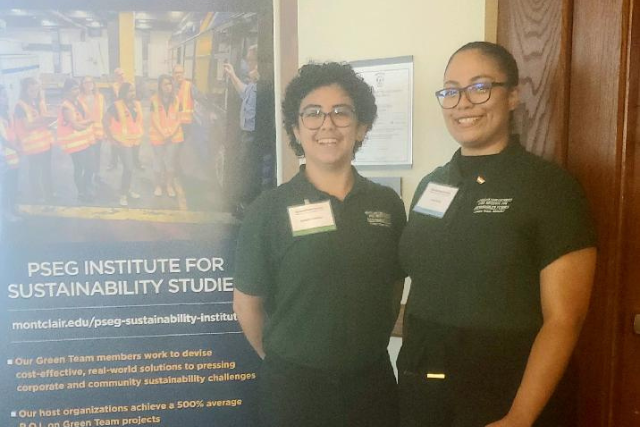For electrical engineering major Yoelis Brito ’23, the drive to create a more sustainable world started in middle school when she participated in neighborhood clean-up projects as part of Earth Day activities.
“I’m from Newark (New Jersey) and was used to litter in the streets, but I didn’t see it as a negative thing — it was just the norm until I started going on college tours and started realizing that other cities were not the same as mine,” she said.
Now as a senior at TCNJ, she wants sustainability to be something that’s attainable for people in low-income communities and is gaining practical and leadership experience to help her do so.

Brito and civil engineering major Isabella Lamboy ’24 were among 50 students from 31 colleges and universities nationwide to participate in the PSEG Institute for Sustainability Studies, a 10-week, paid internship program.
Partnering with businesses and organizations based in New Jersey and across the globe, the PSEG ISS operates out of Montclair State University and pairs “Green Teams” of students with corporate projects that address sustainability challenges from climate change and emissions to clean water and food insecurity.
For her project, Brito worked with a construction and dredging company to inventory their equipment that contains combustible engines. They also performed carbon footprint calculations for the equipment, and presented ways and means to reduce their emissions. The project deliverables involved creating a complicated database, but she says the real-life experience working in a diverse team was just as valuable.
“I took on a leadership role within the team and that brought along learning opportunities,” Brito said. “I started delegating assignments, learning how to handle conflicts between team members, and working to increase our productivity.”
Lamboy worked on a different project, conducting research to inform the preliminary stages of designing a new park in Newark. It was a perfect fit for her, because improving infrastructure is what drives her passion for sustainability.
“It’s easy to suggest putting solar panels on your house or growing a garden in your backyard, but what if you live in an apartment and don’t have a roof or a yard? The system needs to be changed.”
Lamboy hopes to someday have her own firm that would retrofit existing buildings to make them more sustainable.
“Why tear it all down when you could just tweak it a bit?” she said.
Now that’s an idea to build on.
— Emily W. Dodd ’03
